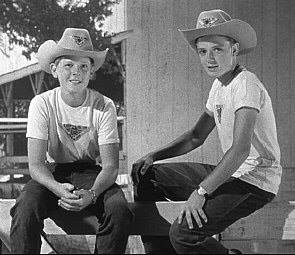Part of growing up in the 1950’s was living vicariously through the television characters we admired. Every kid emulates his role models and we played, acting out our kid heroes in the back yard with their lives of adventure and mystery. One problem was that most of them had intelligent pets which guided and helped them, and if not the animals themselves, save the day.
It never occurred to me that most all the kid heroes of my day were orphans. There was Rusty on Rin-Tin-Tin, who was taken in by the kindly soldiers of Fort Apache. He had a captain-father figure, a bumbling sergeant uncle and a canine German shepherd brother who was more intelligent than the troopers. When we played, my friend Jose would give the famous call, “Yo, Rinty” hoping his dog Sandy would rush to his aid and attack us, but instead she just went off somewhere in the yard to poop.
I used to watch You Asked for It on Sunday evenings until one episode scared me (I think it was the one on the haunted Winchester mansion in California) so I switched channels to Lassie. There was Jeff who lived on a farm with his mom and a chronically exhausted grandfather and, of course, Lassie, the family collie, who just happened to be smarter than all of them.
Although Jeff had a chum named Porky, his down-the-road neighbor, the story revolved around Lassie and her uncanny ability to sniff out bad guys or situations that would occur in a rural setting like falling down a well, getting lost, occasional wild animals or unscrupulous carnival barkers and escaped bank robbers.
Then there was Fury, the story of Joey who lived on a ranch with his uncle and an old bunkhouse occupant, Pete, and Fury, the horse no one could tame and ride except, of course, Joey. There was also Corkey the circus boy, another orphan who had the standard cast of uncles and such but lucked out with not just an elephant pal, but lions, tigers and bears, oh my!
There was Spin and Marty, a fifteen minute serial on the old Mickey Mouse Club show. We would tune in every afternoon to see what was happening to a group of summer camp boys (all 12-13 year old white kids as I remember), ranging from a precocious rich kid with a butler to the urban middle class kid who learned to get along with each other through riding the range and singing songs around the campfire which became another Disney hit song, “Way Out There on the Triple R.” I guess that’s what prompted me to join the Boy Scouts at age eleven.
I admired these TV kids because I, for one, had never been to a circus; never had a horse but, like Jeff and Rusty however, I did have a dog at one point who, unfortunately, did not save me from rustlers and thieves but mostly sat in the yard licking himself or dry humping the living room sofa.
These shows had conflict and resolution and a moral to the story as the characters dealt with family and social problems. Guidance was provided by the adults and companionship from the less brighter friends and the love and devotion from a super intelligent pet.
All these shows had an effect on my personality and it took a while to realize that their perfect lives were not be be jealous of since it was all entertainment and not all kids had pets, loving parents, perfect friends and middle class homes, nor did they go to summer camps or vacation spots. Later, the disappointment and sadness of learning how my childhood idols turned out in later life, made me realize how we can be influenced by television, believing our lives are less fulfilled or happy than our TV counterparts. Especially when they had a dog who could save them from disaster. Or a butler.
